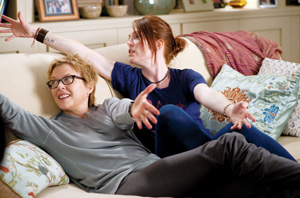SINCE The Kids Are All Right is getting a reputation as “the lesbian Brokeback Mountain” (so said Kathy Wolfe, our local hero and CEO of America’s largest distributor of gay/lesbian films, Wolfe Video), it’s interesting to draw a couple of parallels. The first is the superior job Focus Films did unrolling this small film, the same kind of effort they made for Brokeback.
The second is that just like the Anne Hathaway/Jake Gyllenhaal scene in Brokeback, the most ardent sex in this particular film is heterosexual—a moment of Julianne Moore’s yelp of delight when undressing a man for a fling. This tryst doesn’t at all negate The Kids Are All Right as one of the funniest and most incisive portraits we’ve got of a gay marriage.
Director Lisa Cholodenko and co-writer Stuart Blumberg take their film away from the realm of the typical gay and lesbian film festival–style talkathon and move it up to speed with blogs, Alison Bechdel’s cartoons Dykes to Watch Out For and the fiction of Mary Gaitskill.
As with her previous films, High Art and Laurel Canyon, one respects Cholodenko the most for not being a utopian. In this prime, tart comedy, she creates a pair of wives as capable of passive aggressiveness, sneakiness and ruthlessness as any straight couple. How could anyone deny gay people a right to marriage after seeing that they go through it as badly as anyone who is straight?
We can see how the two harmonize as they share the home they’ve had in Venice Beach for at least 10 years. Moore’s Jules is a classic California girl: no intellectual, very earthy, a blurter-out-er of things she probably shouldn’t have said. Her wife, an obstetrician, Nic (Annette Bening, amusingly dour), comes back from work in a miasma of disapproval, trying to get some relaxation in the very dead bed they share. (Here is the year’s funniest scene of two long-married humans trying to get it on.)
They have two children, both gotten by a sperm donor: Joni (Mia Wasikowska of Tim Burton’s Alice in Wonderland) and Laser (Josh Hutcherson)—”Laser” must have been Jules’ choice. Joni, ready to leave for college, wants to meet the anonymous donor who fathered her. He turns up, a shaggy chef named Paul. It’s Mark Ruffalo in a classic Mark Ruffalo part: a slackerly analogue to the chef of desire that Edoardo Gabbriellini played in I Am Love. Nic and Jules’ kids get along with the man well enough that he starts to become a sort of member of the family. And Jules finds herself becoming disturbingly attracted, despite being as gay as they come.
This story carries a strong sense of place, with deft scenes of life west of the 405. The film begins with the camera taking a skateboard ride and includes a Whole Foods joke: “They push açai berries like crack.” The sense of place gives dimension to these characters and makes the acting reminiscent of the lived-in performances in Mike Leigh films. The most Leigh-like moments come when the cast gathers around a dining table and Nic gets enough wine in her to sing a Joni Mitchell song. (Mitchell is a presiding deity in the film: the Angeleno who has always insisted in her music that her morals weren’t better than anyone else’s just because she was a woman.)
The reason the “kids are all right” is that they’re young enough that their motives are clear. In this comedy, it’s the adults who dissemble and wound each other. Nic looks right through the spouse she supposedly loves; Jules sneaks out and gets sex on the side and victimizes a co-worker who seems to be learning about the affair.
And Paul isn’t any more innocent; it becomes clear that what he really loves isn’t Jules herself, lovable as the pint-size, fearless and charming Moore always is onscreen. Rather, it’s the sense of settlement that draws him in. As a director, Cholodenko is a dry wit. But the way she analyzes the needy, unpretty cores of these characters is what takes The Kids Are All Right out of the realm of the domestic comedy/drama and makes it a film to remember.
The Kids Are All Right
R; 104 min.
Opens July 23




